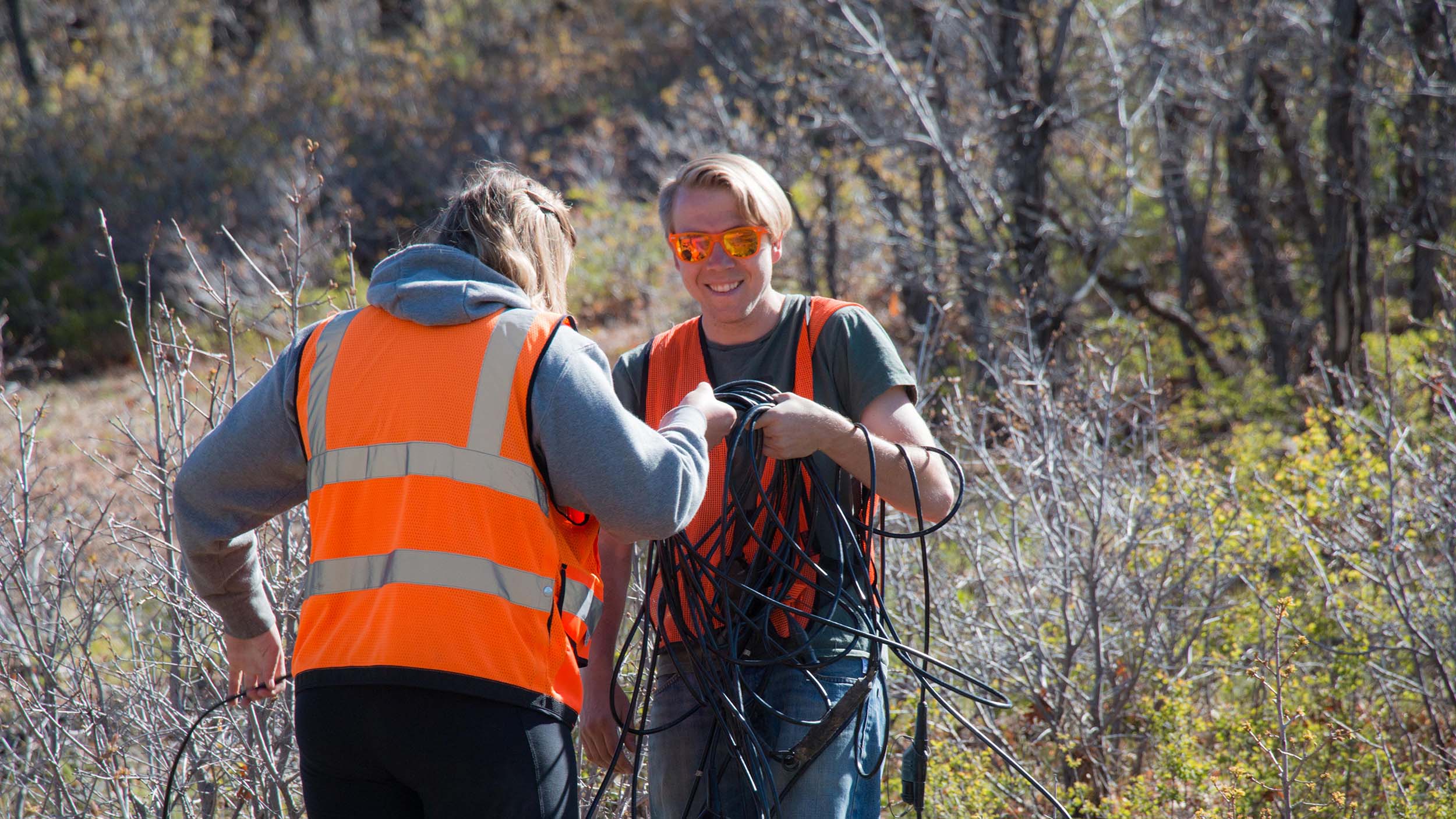Geophysical Engineering
Bachelor’s Degree
Preparing Students Today to Meet the Challenges of Tomorrow
The Bachelor of Science in Geophysical Engineering program at Colorado School of Mines empowers undergraduate students to help meet global needs for energy, water, food, minerals and the mitigation of natural hazards. In the world of geophysics, we are able to do this by exploring and illuminating the dynamic processes of the Earth, oceans, atmosphere and solar system.
Using a combination of mathematics, physics, geology, chemistry, hydrology and computer science, students learn how to analyze the planet’s complex interior, inferring the properties and processes within from measurements collected at the surface, in boreholes and from aircraft and satellites. We prepare our Mines graduates to play a role in providing resources for a growing population, mitigating the threat of earthquakes, volcanoes and other geohazards, exploring other planets and more. And with six unique undergraduate tracks to choose from, students can shape their own path forward.
Learn more about our nationally ranked undergraduate program here: Department of Geophysics website


Experiential major menus
Uniquely tailored to your undergraduate major of choice, these menus offer a wide array of extra-curricular activities that complement and enrich the traditional classroom experience.
Explore the extra-curricular activities that complement your degree.
Geophysical Engineering at a glance

#5 Geophysics program (US News & World Report, 2023)

6 Unique specialty tracks

Immersive Geophysics field camp

Hands-on learning in our Geophysics Discovery Lab
Program Objectives:
- Graduates will be competent professionals who are capable of independent and innovative problem solving, are skilled in scientific computing and are working to address important Earth, energy, and /or environmental problems.
- Graduates will be effective oral and written communicators with exceptional team skills which will allow them to grow in their careers and in professional societies.
- Graduates will recognize economic and social impacts of their work and will have the ability to communicate this to a range of stakeholders (e.g. management, public, peers)
Geophysics Curriculum
Available Minors
- Geophysical Engineering
Career options for geophysical engineering majors:
- Geophysical engineer
- Teaching geophysics
- Field researcher
- Lab analyst

Faculty Spotlight
Dr. Bia Villas Bôas
Dr. Bia Villas Bôas is a physical oceanographer who combines observations, theory, and modeling to help bridge the gap between the ocean and the atmosphere and further our understanding of how coupled air-sea interactions affect the environment. In particular, her research lies at the forefront of quantifying how ocean surface-wave physics shape global climate processes, and impact measurements from remote sensing platforms.
Bôas received a PhD in 2020 from Scripps Institution of Oceanography at UC San Diego. Before joining Mines, she was a postdoctoral scholar at Caltech/JPL.
Making Mines more affordable
Mines’ financial assistance program awards more than $60 million per year, and over 82 percent of the student body receives some form of financial aid.


Why study geophysical engineering at Mines?
Colorado School of Mines has consistently been ranked as one of the nation’s top universities for geophysics. With extensive industry partnerships, opportunities for hands-on undergraduate research, and an esteemed faculty dedicated to your growth and success, it’s no wonder that so many students choose Mines for their geophysical engineering education.
Learn more about our 6 unique undergraduate tracks:
Why do so many students choose Mines?
- Ranked #5 for Geophysical Engineering in the country
- Hands-on field programs
- 6 unique tracks of courses so that you can pursue your interests
- Internationally recognized faculty

Career Outcomes
Many of our incoming students ask: what does a geophysical engineer do? Earning an undergraduate degree in geophysics prepares students for an engaging and versatile career in the world of geophysics. Following graduation, many of our geophysics students have gone on to rewarding geophysical engineer jobs, such as:
- Geophysicist
- Engineering Geophysicist
- Atmospheric Scientist
- Geomagnetician
- Exploration Geophysicist
- Geothermal Specialist
- Professor
- Seismologist
- Meteorologist
- Planetologist
And more. With a degree in geophysics, you’ll have the skills, foundational knowledge and versatility to begin a career that sparks your passions.